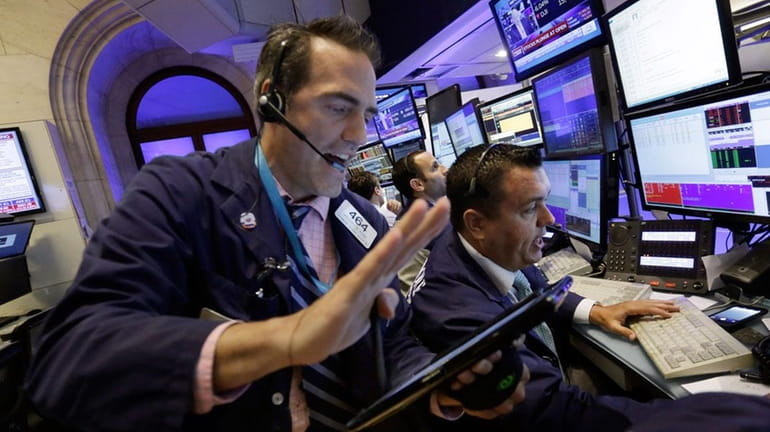Sustained stock market decline could discourage consumers, experts say

Traders Gregory Rowe, left, and Robert Finnerty work in a booth on the floor of the New York Stock Exchange, Monday, Aug. 24, 2015, when stocks closed down about 4 percent. Credit: AP
The stock market's roller coaster ride -- if it continues -- could undermine consumer confidence and augur a pullback on discretionary spending, particularly on luxury items, economists say.
The Dow Jones industrial average Monday lost 588 points, or 3.6 percent. The Standard & Poor's 500 index and the Nasdaq Composite registered similar percentage losses. That wild ride followed a cumulative decline in the Dow of 1,085 points from Tuesday through Friday last week.
While the impact of stock declines on hiring and business investment will be "modest," sustained market volatility "could temper some consumption activity," Millan L.B. Mulraine, deputy head of U.S. strategy at broker T.D. Securities USA, said. Consumer spending accounts for roughly 70 percent of the U.S. economy, economists say.
Chris Christopher Jr., U.S. economist for consultancy IHS Global Insight, said consumer confidence data released in September will reflect recent market gyrations. "It's going to plummet," he said of confidence. "People are worried. Even people who don't own stock."
Irwin Kellner, chief economist for MarketWatch.com, a financial website, said that the markets send a powerful message to individuals, who think: " 'If the big shots on Wall Street are selling, who am I to buy a new house or car?' "
Mulraine said much of the turmoil centered on "somewhat dire" predictions about China's economic growth. China, the world's second-largest economy after the United States, has shown signs of a slowdown. The key Shanghai Composite stock index, which had risen around 150 percent since late 2014, fell 8.5 percent Monday after sharp declines last week.
"The key question is whether the authorities in China have this under control," Mulraine said. "The market is beginning to doubt their ability to deal with this."
John Rizzo, chief economist of the Long Island Association, the Island's largest business group, said that based on common financial yardsticks such as the price-to-earnings ratio of the Dow stocks, U.S. equities do not appear overpriced. "The reasons [for the U.S. stock market's recent decline] seem to be more based in psychology and fear than real economic issues," he said.
As for Long Island, Rizzo said the economy seems buoyant with real estate returning to health and strong hiring in leisure and tourism.
Urologist sexual abuse case ... Carcinogens found in West Islip ... Lab results for Bethpage park drums ... Rangers win game 2
Urologist sexual abuse case ... Carcinogens found in West Islip ... Lab results for Bethpage park drums ... Rangers win game 2

